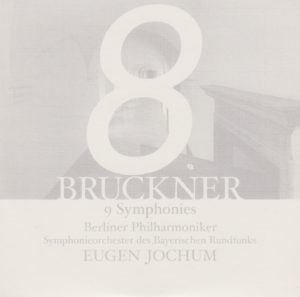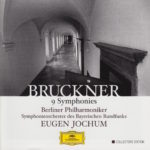 This morning’s conductor of Anton Bruckner’s Symphony No. 8 in C Minor (WAB 108) (nicknamed “The Apocalyptic,” although I don’t know why) is German-born Eugen Jochum (1902-1987), unarguably one of the most highly respected interpreters of Anton Bruckner’s music who ever lived.
This morning’s conductor of Anton Bruckner’s Symphony No. 8 in C Minor (WAB 108) (nicknamed “The Apocalyptic,” although I don’t know why) is German-born Eugen Jochum (1902-1987), unarguably one of the most highly respected interpreters of Anton Bruckner’s music who ever lived.
I have two CD box sets featuring Maestro Jochum – this one, on the DG label (which I call the “White Box”), and another on the Warner Classics label (which I call the “Green Box”). I chose to listen to the symphony from the DG set first because the recordings are older. (I figured alpha by conductor, then by chronological order of the date of the recording was a fair enough delineator.)
As a reminder, this is from the Wikipedia entry for Jochum:
Jochum was born to a Roman Catholic family in Babenhausen, near Augsburg, Germany; his father was an organist and conductor. Jochum studied the piano and organ in Augsburg, enrolling in its Academy of Music from 1914 to 1922. He then studied at the Munich Conservatory, with his composition teacher being Hermann von Waltershausen; it was there that he changed his focus to conducting, his teacher being Siegmund von Hausegger, who conducted the first performance of the original version of the Ninth Symphony of Anton Bruckner and made the first recording of it.
Regarding his podium technique, Kenneth Woods blogs, “Look at his hands — very small and focused motions but so powerful.” Woods also states that “his sense of rubato, while still incredibly daring, is perhaps more un-erring than [that of] even Wilhelm Furtwängler.”
Jochum’s older brother Otto Jochum (1898–1969) was a composer and choral conductor; his younger brother Georg Ludwig Jochum (1909–1970) was, like Jochum, an orchestral conductor. His daughter Veronica Jochum is a pianist on the faculty of the New England Conservatory of Music in Boston, Massachusetts.
Jochum died in Munich in 1987, at the age of 84. His wife Maria predeceased him, in 1985.
The orchestra is the Berliner Philharmoniker.
So far, I’ve been privileged to hear 14 performances conducted by Maestro Jochum – seven from the “White Box” and seven from the “Green Box.” As I’ve discovered, I prefer one of those box sets over the other. But I’ll save the subjective stuff for later.
I first encountered Eugen Jochum in my 144-day project on Day 6, Symphony No. 1 (White Box)
Then again on Day 22, Symphony No. 2 (White Box).
Then again on Day 38, Symphony No. 3 (White Box).
Then again on Day 54, Symphony No. 4 (White Box).
Then again on Day 70, Symphony No. 5 (White Box).
Then again on Day 86 Symphony No. 6 (White Box).
Then, most recently, on Day 102.
First, just the facts, Ma’am:
 Bruckner’s Symphony No. 8 in C Minor (WAB 108), composed 1884-1890
Bruckner’s Symphony No. 8 in C Minor (WAB 108), composed 1884-1890
Eugen Jochum conducts
Jochum used “Version: 1887-90; ed.: Leopold Nowak,” according to the CD booklet
Berliner Philharmoniker plays
The symphony clocks in at 74:16
This was recorded in Berlin, Germany, in January of 1964
Jochum was 62 when he conducted it
Bruckner was 66 when he finished composing it
This recording was released on the Deutsche Grammophon (DG) label
Bruckner wrote his symphonies in four parts. The time breakdown of this one (Symphony No. 8 in C Minor, Nowak edition), from this particular conductor (Jochum) and this particular orchestra (Berliner Philharmoniker) is as follows:
I. Allegro moderato…………………………………………………………………………….13:41
II. Scherzo. Allegro moderato…………………………………………………………….14:02
II. Adagio. Feierlich langsam; aber nicht schleppend……………………….26:42
IV. Finale. Feierlich, nicht schnell……………………………………………………….19:50
Total running time: 74:16
Now, for the subjective aspects:
My Rating:
Recording quality: 5
Overall musicianship: 5
CD liner notes: 4 (includes two superb essays, one by Jochum)
How does this make me feel: 5
Another “Huzzah!” performance from Maestro Jochum!
The brass was well balanced with the strings. And there was a palpable energy to this performance. At the ends of the movements, I was left hanging on the edge of my seat, eager to hear more (regarding the first three movements), or delighted with the entire performance (as I was after the Finale).
There’s a somberness, a reverence, but also an incredible feeling of exaltation to the Adagio.
For example, the nine ascending notes from 2:37 to 2:53 are like climbing – to use a well-known phrase – the stairway to heaven. Only this time, there are only nine steps to traverse. At the bliss I feel at the top is indescribable. Those nine ascending notes fill me with emotion and joy.
This is a terrific performance.
Highly recommended.
